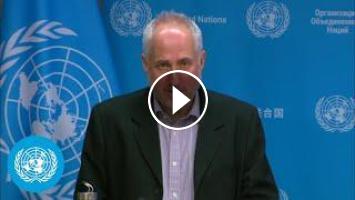Noon Briefing by Stéphane Dujarric, Spokesperson for the Secretary-General.
Highlights:
-Secretary-General/Jordan
-Occupied Palestinian territory/ Humanitarian
-Security Council
-Sudan
-Democratic Republic of the Congo
-Sahel
-Bangladesh
-Trust Fund in Support of Victims of Sexual Exploitation and Abuse
-Senior personnel appointment
-Children and Armed Conflict report
SECRETARY-GENERAL/JORDAN
The Secretary-General arrived in Jordan today. He is scheduled to attend the High-Level Conference on Gaza that is being organized at the invitation of Jordan, Egypt and the United Nations. That conference will take place, starting tomorrow, in Jordan near the Dead Sea.
In remarks the Secretary-General is expected to deliver at the conference tomorrow, he will shed light on the deplorable situation in Gaza, the deplorable conditions in Gaza. As you may know by now, the conference is called “Call for Action: Urgent Humanitarian Aid for Gaza”.
The Secretary-General is also expected to renew his calls for a ceasefire, along with the unconditional release of all the hostages still being held.
On the margins of the conference, he will hold discussions with other leaders on the issue on both humanitarian and political levels.
OCCUPIED PALESTINIAN TERRITORY/ HUMANITARIAN
The Office for the Coordination of Humanitarian Affairs (OCHA) reports that the Israeli military operation in the Nuseirat refugee camp overwhelmed the already limited capacity of hospitals, especially Al Aqsa and Al Awda hopitals in Deir al Baleh and the Nasser Medical Complex in Khan Younis. A UN inter-agency mission to Al Aqsa hospital on Saturday found that the facility was hosting about 700 patients, which is nearly five times the capacity for in-patient services. Just one generator at the hospital is still running.
Fuel is also critically short in Gaza. Colleagues working on water, sanitation and hygiene report that just 20 per cent of the fuel needed for vital water and wastewater facilities was received during the week of 26 May. These shortages, compounded by power cuts and damage to infrastructure, are severely disrupting operations and limiting people's access to water. As of 2 June, daily water production stood at just 26 per cent of pre-conflict levels.
For its part, the United Nations Relief and Works Agency for Palestine Refugees in the Near East (UNRWA) said that many displaced families in Gaza are forced to rely on dirty sea water for their daily needs. The increasing heat and lack of hygiene are making an already dire situation even worse.
Meanwhile, the World Food Programme (WFP) colleagues tell us that we are temporarily pausing operations at the floating dock until a thorough assessment of the security situation is conducted to ensure the safety of our staff and our partners.
The WFP 's position, as the logistics arm of the UN operation in Gaza, has always been that it will support any UN and international effort to increase the flow of humanitarian supplies into Gaza and the World Food Programme has welcomed the relief that has been received through the pier since it started operating. A total of 85 WFP trucks carrying some 748 metric tonnes of humanitarian supplies have been delivered so far.
The UN Women has put out its latest Gender Alert on Gaza, and it says that 80 per cent of women in Gaza depend on food assistance to survive.
SECURITY COUNCIL
This morning, Abdou Abarry, the head of the UN office for central Africa, briefed the members of the Security Council. He told council members that the region he covers has witnessed some positive and encouraging trends, noting that the conclusion of the transition period in Chad, but he added that the difficult environment in which the country finds itself reminds us of the need to continue supporting the Chadian authorities in their quest for stability, particularly at this new turning point in the country's history.
Turning to the situation in Gabon, Mr. Abarry said the transition reached an important turning point in April with the holding of an inclusive national dialogue.
He highlighted that the threat of unconstitutional changes of government remains an ongoing concern, as evidenced by the recent attempt to do so in the Democratic Republic of Congo.
Mr. Abarry said we are working to call on the States of the sub-region to keep the political space open by guaranteeing freedom of expression, freedom of the press and the free exercise of the activities by political parties.
Full Highlights:
https://www.un.org/sg/en/content/noon-briefing-highlight?date%5Bvalue%5D%5Bdate%5D=10%20June%202024
Highlights:
-Secretary-General/Jordan
-Occupied Palestinian territory/ Humanitarian
-Security Council
-Sudan
-Democratic Republic of the Congo
-Sahel
-Bangladesh
-Trust Fund in Support of Victims of Sexual Exploitation and Abuse
-Senior personnel appointment
-Children and Armed Conflict report
SECRETARY-GENERAL/JORDAN
The Secretary-General arrived in Jordan today. He is scheduled to attend the High-Level Conference on Gaza that is being organized at the invitation of Jordan, Egypt and the United Nations. That conference will take place, starting tomorrow, in Jordan near the Dead Sea.
In remarks the Secretary-General is expected to deliver at the conference tomorrow, he will shed light on the deplorable situation in Gaza, the deplorable conditions in Gaza. As you may know by now, the conference is called “Call for Action: Urgent Humanitarian Aid for Gaza”.
The Secretary-General is also expected to renew his calls for a ceasefire, along with the unconditional release of all the hostages still being held.
On the margins of the conference, he will hold discussions with other leaders on the issue on both humanitarian and political levels.
OCCUPIED PALESTINIAN TERRITORY/ HUMANITARIAN
The Office for the Coordination of Humanitarian Affairs (OCHA) reports that the Israeli military operation in the Nuseirat refugee camp overwhelmed the already limited capacity of hospitals, especially Al Aqsa and Al Awda hopitals in Deir al Baleh and the Nasser Medical Complex in Khan Younis. A UN inter-agency mission to Al Aqsa hospital on Saturday found that the facility was hosting about 700 patients, which is nearly five times the capacity for in-patient services. Just one generator at the hospital is still running.
Fuel is also critically short in Gaza. Colleagues working on water, sanitation and hygiene report that just 20 per cent of the fuel needed for vital water and wastewater facilities was received during the week of 26 May. These shortages, compounded by power cuts and damage to infrastructure, are severely disrupting operations and limiting people's access to water. As of 2 June, daily water production stood at just 26 per cent of pre-conflict levels.
For its part, the United Nations Relief and Works Agency for Palestine Refugees in the Near East (UNRWA) said that many displaced families in Gaza are forced to rely on dirty sea water for their daily needs. The increasing heat and lack of hygiene are making an already dire situation even worse.
Meanwhile, the World Food Programme (WFP) colleagues tell us that we are temporarily pausing operations at the floating dock until a thorough assessment of the security situation is conducted to ensure the safety of our staff and our partners.
The WFP 's position, as the logistics arm of the UN operation in Gaza, has always been that it will support any UN and international effort to increase the flow of humanitarian supplies into Gaza and the World Food Programme has welcomed the relief that has been received through the pier since it started operating. A total of 85 WFP trucks carrying some 748 metric tonnes of humanitarian supplies have been delivered so far.
The UN Women has put out its latest Gender Alert on Gaza, and it says that 80 per cent of women in Gaza depend on food assistance to survive.
SECURITY COUNCIL
This morning, Abdou Abarry, the head of the UN office for central Africa, briefed the members of the Security Council. He told council members that the region he covers has witnessed some positive and encouraging trends, noting that the conclusion of the transition period in Chad, but he added that the difficult environment in which the country finds itself reminds us of the need to continue supporting the Chadian authorities in their quest for stability, particularly at this new turning point in the country's history.
Turning to the situation in Gabon, Mr. Abarry said the transition reached an important turning point in April with the holding of an inclusive national dialogue.
He highlighted that the threat of unconstitutional changes of government remains an ongoing concern, as evidenced by the recent attempt to do so in the Democratic Republic of Congo.
Mr. Abarry said we are working to call on the States of the sub-region to keep the political space open by guaranteeing freedom of expression, freedom of the press and the free exercise of the activities by political parties.
Full Highlights:
https://www.un.org/sg/en/content/noon-briefing-highlight?date%5Bvalue%5D%5Bdate%5D=10%20June%202024
- Category
- United Nations
- Tags
- UN, United Nations, UNGA
Be the first to comment













